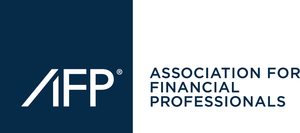BETHESDA, Md., July 12, 2017 /PRNewswire/ -- Nearly a year after new money-market fund regulations by the United States Securities and Exchange Commission took effect in October 2016, 41 percent of organizations have no plans to consider investing in prime funds. For press queries, please contact Melissa Rawak at [email protected].
In a survey of 638 corporate treasury and finance professionals conducted in April, the 2017 AFP Liquidity Survey, underwritten by State Street Global Advisors, found that organizations maintain 53 percent of their short-term investment portfolio in bank deposits, underscoring the importance of safety of principal as an investment policy objective. Sixty seven percent of organizations indicate that safety is the most important short-term investment objective for their organizations, and, as a result, hold 76 percent of their short-term cash in bank deposits, money market funds and Treasury securities. Allocations in money market funds continued to shift from prime funds to government funds, further demonstrating the emphasis on safety and the adverse impact of money fund reform on prime funds as investment vehicles.
"While we've witnessed significant shifts in the landscape of cash management over the past year, clients clearly continue to adhere strongly to the investment objectives of safety of principal and liquidity, said Yeng Felipe Butler, Head of SSGA's Global Cash Business. "In the four decades that State Street Global Advisors has had the privilege of providing solutions to cash investors, we have seen these objectives sustain and have honed our portfolio management discipline and built a client service model to address these objectives."
On a net basis, 14 percent of organizations increased their cash holding in the past 12 months. Of those organizations that increased cash holdings, 69 percent reported that this was the result of higher operating cash flow. Nearly a third of organizations (32 percent) that decreased their cash holdings cited increased capital expenditures as the primary reason.
Among those respondents who anticipate that their organizations will increase cash holdings in the next 12 months, 79 percent say it will be as a direct result of increased operating cash flow. Meanwhile, 39 percent of respondents who expect to decrease their cash holdings in the next 12 months say they will do so primarily because of increased capital expenditures. For more information on this survey, please visit www.AFPonline.org/liquidity.
"Money fund reform continues to have adverse impacts on institutional investors, depriving them of a proven, effective cash management tool. The flight from prime funds is also starving the economy of a critical source of short-term capital for large businesses," said AFP President and Chief Executive Officer Jim Kaitz. "Despite these changes, many businesses are expanding globally, increasing their cash flow, and beginning to make strategic investments to fuel future growth. These are positive developments for the economy."
About AFP®
Headquartered outside Washington, D.C., the Association for Financial Professionals (AFP) is the professional society committed to advancing the success of its members and their organizations. AFP established and administers the Certified Treasury Professional and Certified Corporate FP&A Professional credentials, which set standards of excellence in finance. Each year, AFP hosts the largest networking conference worldwide for over 6,500 corporate finance professionals.
SOURCE Association for Financial Professionals
Related Links
WANT YOUR COMPANY'S NEWS FEATURED ON PRNEWSWIRE.COM?
Newsrooms &
Influencers
Digital Media
Outlets
Journalists
Opted In





Share this article